Achieving The Impossible by Getting That Full Amateur Radio Licence
Amateur radio is a hobby, albeit one of a minority interest, but attracts wide range of enthusiasts, of different skills, ages and personalities etc. Wikipedia says that there are something like 3 million licenced radio amateurs throughout world. Specifically; 760,000 in US; 382,000 in Japan; 63,000 in Germany and 76,000 in the UK.

Amateur radio operators have been granted an amateur radio license to transmit on designated frequencies (known as amateur bands) by a governmental regulatory authority after passing an examination on applicable regulations, electronics and radio theory, and radio operation and procedures. In the UK that authority is Ofcom. Not every country allows amateur radio, but most do although the requirements can vary significantly in each country. As part of their license, amateur radio operators are assigned a call sign that they use to identify themselves during communication. The age range of licenced radio amateurs is from 8 to 100, however, worryingly, the average age in the UK is approaching 60+years so attracting people, particularly younger ones into the hobby is important if it is to survive. The majority of radio amateurs are male.
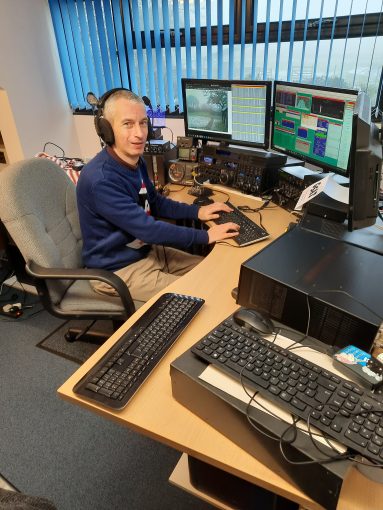
Amateur radio is very broad church with many areas of interest, all of which have their supporters and detractors. This include the various modes of operation, i.e. digital; analogue; morse (cw) ; fast scan or slow scan television, terrestrially via the ionosphere or via satellites, repeaters, even the internet.
The amateur radio transceiver to most users, is now just another “black box”. The technology can range from simple low power self-build equipment to very sophisticated, high performance radio sets, pushing at the boundaries of design and manufacture. Although some technical knowledge is required to obtain a licence to transmit, many radio amateurs will solely devote their time to operating their equipment and will never look inside their radios or even care how they work as it is unlikely they will understand the technology enough to fault-find. This is quite different to the ham radio scene 60 years ago when financial restrictions demanded more technical understanding to enable self-build or repair of your equipment. Of course, then there was a good knowledge base of ex-military, services or apprentice trained personnel with practical skills no longer being taught in most schools or colleges. In those days it was the norm to repair or service your own equipment, but modern technology with its integrated circuits, surface mount components, software driven systems has put those days behind us.
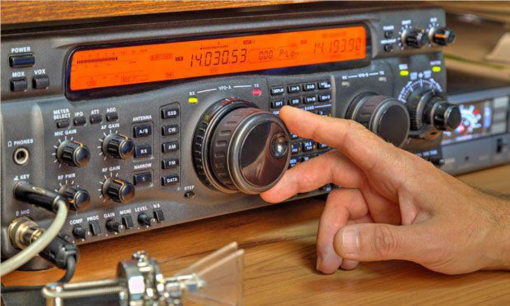
Other popular aspects of amateur radio include operating mobile from a vehicle or portable from a local beauty spot or even some hard to get to exotic location where no-one else has ever operated from before. National and International Contests are also held between radio amateurs to make the most contacts over a set period of time and this is another feature of the hobby very popular with some amateurs and disliked by others.
In the UK radio amateurs can be licenced to operate at three levels; Foundation, Intermediate and Full. Each level accords the licensee additional privileges which usually cover transmitting power and frequencies and supervisory roles. These levels are progressive and are designed to demonstrate a number of skills covering procedural and licence conditions, technical knowledge in electronics, propagation, performance, antennas, measurements, safety, preventing interference to other radio systems etc
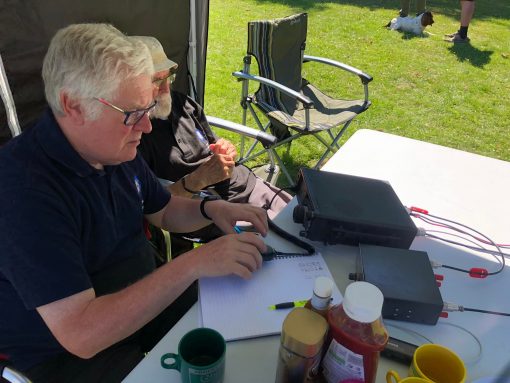
So we have a hobby which is followed both by technically savvy and technically illiterate people. To get a licence to transmit we are required to take an examination which tests our reading, cognitive and technical knowledge. Intermediate and Full licence examinations will test us further on all those subjects and more, including some mathematical skills and the use of a scientific calculator. Hardly a level playing field if one candidate has a degree in electronics and the other has no academic qualifications whatsoever, and possibly never been in a learning situation for some 30+ years or more. But the wonderful thing about this hobby is that people from either of those educational backgrounds do progress in the hobby and reach the highest levels of licence classification. That is because the primary ethos of the hobby is self-training, recreation and public service. In the past, in times of conflict or disaster, radio amateurs would often become help the emergency services or be assigned to the defence authorities where their communication skills could be of some use. Many radio amateurs were seconded as Voluntary Interceptors during WW2 to intercept enemy transmissions for de-crypting by the intelligence services – not likely to be needed in modern times, although various radio amateur organisations still provide communications links during natural or man-made disasters when infrastructure facilities are unavailable.
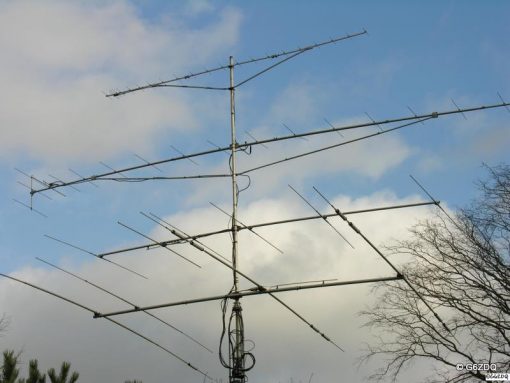
So how do we level up this playing field to give those of you who want to be radio amateurs the opportunity to do so?. The answer lies in suitable training programmes to support the three tiered progressive licencing regime currently allowed in the UK.
It starts at Foundation level where you learn about important licencing conditions and good operating procedures as well as how to operate safely and not interfere with other radio users. You also introduced to some technical basics such as Volts, Amps and Resistance. You also learn how a simple transmitter and receiver functions and the role of the antenna and RF radiation (propagation). When you pass the Foundation examination you get an M7XXX callsign. This allows you to transmit on most of the amateur bands with a maximum power level of 10 Watts (soon to be 25W). Many people get their Foundation Licence training on–line through volunteer groups or self-learn using the RSGB Foundation manual.
Once you have your Foundation licence you can proceed to the Intermediate level which will add to your technical knowledge. You will also be introduced to some calculations and engineering notation. But fear not, you won’t have to remember formulae as these are provided in exam but you will know what the formulae for. At this stage of your training you will be required to understand concepts rather than just remember them which you can get away with at Foundation level. This usually requires a more structured training programme. It also needs to prepare you for Full Licence which has a much higher technical requirement. Again there is a multi-choice examination and once you have passed this you get more privileges including an increase in the RF transmitter power to 50W (soon to be increased to 200W). At Intermediate level you get a 2E0XXX call-sign (soon to be changed to M8 or M9 series).
Finally you can then go on to gain a Full Licence which again adds to your technical knowledge and other skills and gives you full licence privileges including maximum transmitting power (400W – soon to be increased to 1000W on some bands), access to all frequency bands and modes. At this level the technical knowledge learnt is quite significant, (probably GCSE + level) and the Maths required is also more involved. Again there is a multi-choice examination and if successful you gain an M0XXX call-sign. Some clubs still provide classroom training but they are now few and far between since the pandemic. Most training is now done on-line and even examinations are available to be taken on-line.
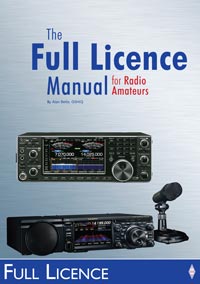
So what makes a good training programme?. It has to be able to take someone without academic or technical training or had the recent experience of sitting examinations and help them understand the concepts of basic electronics, radio communications including working with mathematical formulae using a scientific calculator. One of the most successful Intermediate and Full Licence Training providers is the Bath Based Distance Learning group run by Steve Hartley G0FUW. Since 2011 Steve and his team have helped around 1000 students obtain their Full Licence with a pass rate approaching 90% compared to the national average of around 66%. They run a Full Licence Course from August to December and an Intermediate Licence Course from January to May. Students receive weekly work packages via an online classroom and have access to weekly online tutorials. Each student is allocated to one of the remote tutors who provide feedback and additional guidance. I have been aBBDL tutor since 2012. There are weekly quizzes to check on progress and at the end of the course there are a number of mock exams. There is no charge for the training, but applicants must work through some pre-course material and complete a quiz to be eligible for a place.
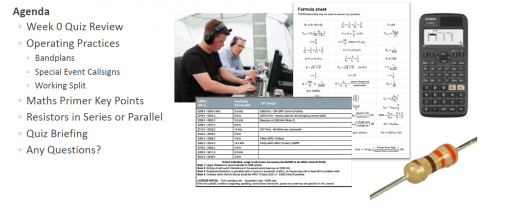
The essence of this course is that it is very structured. It is based around a Syllabus which produced by the Radio Society of Great Britain (RSGB) and approved by Ofcom. The course ties in the material in Course Books (again published by the RSGB) with the requirements of the Syllabus, so that everything that is examined is covered by the course. The team behind the course have put in an incredible amount of time and research to make sure there are no gaps in the training and that each week’s topics tested by a quiz which the students do under timed conditions. The weekly tutorials are optional but are at the same time every Wednesday evening on Zoom. If a student is unable to watch a tutorial in real time a YouTube video of it is available to watch the next day. The tutorial is also supported by a power point presentation and this also available as a PDF to download the next day. Weekly Tutorials follow a set format;
- Tutorial Agenda
- Review of Previous Week’s Quiz
- Review of Practical Exercises (if applicable)
- Tutorial on week’s Topic(s)
- Any Questions?
- Introduction to this week’s Quiz
- Next week’s Tutorial
Weekly instructions are also available to download which tells the student what he is expected to do that week, viz;
- Attend (or watch) class tutorial
- Check Progress and Revise Weak spots (based on quiz results)
- Study the Week’s Text from the course book (identifies pages to be covered)
- Identifies any additional Reading or Exercises recommended to follow
- Watch any Recommended Videos on the Topic
- Do the Quiz in time for next week’s Tutorial.
Every 4th week is a revision week where students have the opportunity to catch up if they are a bit behind or even go over the results from the previous quizzes and revise any weak areas that may bave been shown up. This is in preparation to an After Week 3 (or after week 6 ,9, etc as applicable) quiz which tests the students on what they have been taught so far. These After Week quizzes get larger each time as there is more material to revise as the course progresses. At the end of the course, the student is expected to have a go at several Mock exams similarly structured to the ones set by the RSGB, but not using any questions that are in the RSGB exam question database which are kept secret. It is the tutor’s job to supply the students with worked answers for all the quizzes and mock exams after they have been submitted and to help them with any queries they may have on the questions or course material. The tutor also keeps in contact with the student over his progress and will chivvy them along if they fall behind. We are also there to convince the student that they can do this when things get tough
The BBDL Intermediate course runs for 19 weeks and the Full course runs for 20 weeks. Both of these courses call for a serious commitment from the student. In addition to the 2 hour weekly tutorial, you will need to spend another 2 to 4 hours studying each week’s material, preparing for and doing the weekly quiz. These courses are a real challenge and if your work and home life cannot accommodate this level of commitment then you will struggle. However if you can rise to the challenge, and put the hours in, you will achieve something you probably thought would never be possible. More than that you will have done something you can be really proud of because it says a great deal about the sort of person you are.
Inspired by Clive M0KNP (retired Community Psychiatric Nurse) whom I tutored from Foundation to Full Licence 2020-2024.
Written By Chris Pettitt G0EYO

